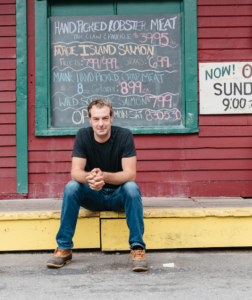The Key To Aquaculture Advocacy Is Education
 Editor’s note: The following is a guest blog post by chef, author and seafood advocate Barton Seaver. GAA and Seaver recently announced a partnership to raise public awareness of responsible aquaculture and the importance of sourcing seafood with provenance.
Editor’s note: The following is a guest blog post by chef, author and seafood advocate Barton Seaver. GAA and Seaver recently announced a partnership to raise public awareness of responsible aquaculture and the importance of sourcing seafood with provenance.
I live on the coast of Maine where my wife and I have chosen to raise our young son. We spend our days surrounded by neighbors who exemplify the region’s legendary work ethic, energetic community involvement, and drive to protect our natural resources, both on land and at sea.
As idyllic as that reads, Maine is not insulated from societal problems. Our population is aging fast and young people leave the state in search of better jobs. One in four children live with food insecurity. We struggle with the ills of the opioid epidemic. And we harbor an anxiety that comes from relying on a rapidly changing environment for sustenance and economic opportunity.
A beacon of hope for addressing these issues in Maine – and, I think, much further afield – is responsible aquaculture. We can tap into aquaculture to provide the young and old with healthy seafood; to preserve our heritage of hard-working, vibrant coastal communities; and, to create interesting employment opportunities that will allow us to tap into a new economic geography.
In Maine, the exploding aquaculture industry comprises established companies running state-of-the-art, re-circulating systems on land, and ever-improving pen and net systems in the open ocean. The entrepreneurial Maine mariculture scene includes over 90 commercial oyster and mussel farms, dozens of seaweed operations, and groundbreaking work in scallop, soft-shell clam and American eel farming.
I am an aquaculture advocate. But my story is a redemptive one. Fifteen years ago I was a top seafood chef in Washington, D.C. I used that platform to espouse a negative view of aquaculture. My opinion was based on a limited scope of information I gathered from environmental advocacy groups concerning the state of the aquaculture industry at that point in time. As my career progressed, I gained an understanding of the full context of aquaculture’s impact, both positive and negative.
I left the restaurant industry a decade ago and took an assignment as a National Geographic Explorer. My mission focused on marine ecosystems, discovering strategies to minimize human impact upon them. I came to understand that the end result of environmental sustainability is the endurance of thriving human communities. Certainly, the coastal way of life depends on a resilient marine ecosystem of which we must be good stewards. I have witnessed significant advances in the sustainability of aquaculture practices. And while there is still much improvement to be made I now believe that with aquaculture, as with fisheries, we can sustainably capitalize on marine resources in ways that maximize the positive influence resilient ecosystems can embody for humans.
But if aquaculture is going to continue to innovate toward ever-better practices and efficiencies, we as consumers have a role to play by expanding the market for farmed seafood. We’ve got to work to give chefs, cooks and eaters alike products they can very easily say “yes” to. Tilapia from industry-leading producers such as Regal Springs is a great example. It’s accessible, versatile, healthy and sustainable.
So my mission is one of education. I work to educate home cooks through food media where I share with them just how easy it is to serve seafood on a Tuesday night, and espouse how elegant it is to serve seafood at a dinner party on a Saturday night. I work to educate chefs – ones who operate white-table cloth restaurants, others who work the lines in more mainstream, casual establishments, and still more who work in institutional food service.
At the core of my efforts is a simple ask. It’s an invitation to look anew at an industry that we’ve not yet embraced, and in some cases marginalized. It’s true that unsustainable practices in the industry rightfully earned it a bad reputation. But the industry has advanced rapidly. The first salmon net pens went into U.S. waters just three decades ago. Think about how far other technologies like phones and computers have advanced in 30 years. We need to consider just how far aquaculture has come in that same time frame and reconsider our perceptions of it.
We need to learn about and embrace the very positive aspects of aquaculture. We must hold accountable unscrupulous producers who do not use best practices and whose actions diminish the reputation of all producers. And we must equally hold accountable the very best producers, to press these leaders to continuously improve their practices. This is an industry so young it still wears a teenage swagger that signals anything is possible. And from what we are learning about the prodigious potential of aquaculture, this opportunity does inspire a youthful enthusiasm for the future. Aquaculture is an aspect of our local, regional, national and international food systems that we get to create from scratch. We have the occasion to be the architects of an emerging blue economy that can steward the seas, sustain communities, and enable people to thrive. That is a lot of promise for such a little ask.




